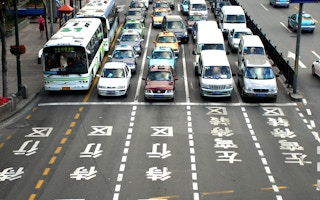In the beginning, it wasn’t easy. Seven years ago, when Eaton entered China, the company faced bitter competition from domestic rivals and a shifting regulatory landscape.
The government had recognised the green auto industry as a major growth area, but had given locally made hybrid system providers a leg-up.
While not quite blocked from the market, new regulations meant that Eaton could not get access to government incentives for converting bus fleets. These incentives were critical to secure sales, and without subsidies the company was seriously outgunned by domestic rivals.
The only way to compete and win in China was to find a new partner, and develop a completely new business strategy.
Enter E-Drive, a young company formed in 2008 from a deal between three firms, Shanghai Annaida Drive Technology, Beijing E-power Co, and Ningbo Yunsheng Co.
E-Drive was still a young company focused on the research and design of hybrid technologies when Eaton approached them in 2009. Unlike others in its sector, E-Drive was a partner that could help overcome the protectionism and regulations of the local domestic market.
How? By working very closely together as a team, and co-producing hybrid systems for the China market.
The relationship with E-Drive deepened over the course of the next six years, and so sales across China continued to grow as costs fell.
Right at the beginning of the relationship, the products developed in partnership were E-Drive’s main source of revenue. Ultimately, these products helped the E-Drive brand become one of the strongest of its kind in China, and one that now counts all of the country’s major auto firms as customers.
“Without our partners, continued success in the China market would have been very difficult,” says Joe Zhou, president of Eaton China. “And without Eaton’s commitment, our partner’s chances to grow their market would have been low.”
Firms wanting to enter China are attracted to the vast scale of the market and the need for solutions to massive economic, social, and environmental challenges. But even globally recognised market leaders have major obstacles to overcome.
The biggest challenge for new entrants is getting a clear picture of exactly how big the opportunity is, and creating a genuine value proposition that answers market demand.
To do this well, firms need to have a local strategy - they need to empower local teams to develop and manage the opportunity, and at the same time, they need to actively engage local stakeholders.
And they need to remain aware of the shifting sands of China’s regulatory landscape and stay agile to the changes that will inevitably unfold as the sector develops.
China is different.
It’s not like in the West, where sustainability is often linked to consumerism, corporate social responsibility and calculated by emissions. In China, sustainability is defined by the real and present concerns of poor water quality, food safety, and air pollution.
Over the past two decades, China’s private car market has exploded, and vehicle pollution has become a major source of air pollution; 22 per cent of air pollutants in the capital, Beijing, are from cars. This percentage has surpassed 60 per cent in other cities.
Current countermeasures include restrictions on the sale of new vehicles, incentives for electric vehicle development, road space rationing and a push for more people to use public transport.
“
The only way to compete and win in China was to find a new partner, and develop a completely new business strategy.
New technology is helping too. Eaton provides vehicles with clean energy drive systems, competitive pricing, and the ability to reduce fuel consumption by 20 to 30 per cent.
Unlike other brands in the market, Eaton has developed its own hybrid electric, plug-in, and parallel hydraulic series solutions. These solutions enable customers to convert to green fuel without breaking the bank.
Eaton partnered with one of China’s top commercial vehicle makers, Foton, to develop and prototype two buses just before the 2008 Beijing Olympic Games. That was a crucial test for the technology, which generated considerable interest in several tier 1 cities amid the hype of the Olympics.
Foton wanted to expand its bus sales and was able to give Eaton key access to the market through its relationships with local governments, urban planning agencies and regulators. It was an early test, and a steep learning curve.
The opportunity for firms that can solve sustainability-related problems is real in China. But newcomers need to be mindful of who they work with to ensure a sustainable future.


















